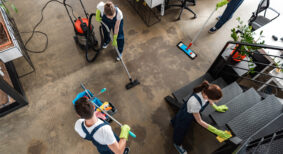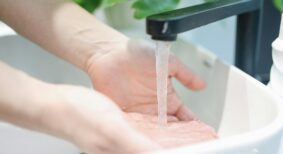Healthcare housekeeping (HSK) and environmental service (EVS) work is a hard job. It is also a crucial job. Those two things should be obvious, but that hasn’t always necessarily been the case.
“Typically, in the past, the general understanding has been that HSK/EVS are the folks who come in and cleaned up after everybody,” says Julie Hoeflaak, Education Chair of the Canadian Healthcare Housekeepers Association (CHHA). “There wasn’t the realization that we do more than surface-level cleaning; that we’re essential and we’re vital. Our role as part of the healthcare team was not acknowledged; it was thought not to be integral in disinfection or infection control or preventing transmission. There was even ignorance of the fact there was science and standards and protocols behind what we do.”
In that context, the CHHA dedicates itself to embodying, advocating for, and educating and training housekeeping and EVS professionals across Canada.
Founded 65 years ago in 1957, the Ontario Healthcare Housekeepers Association Inc. (OHHA) spent decades leading from the front to increase the recognition and understanding of the integral role of housekeeping and EVS workers as part of the team caring for patients, residents, staff, and visitors in healthcare facilities.
In October 2020, OHHA merged with ISSA, the worldwide cleaning industry association, to expand its mission across Canada and better reflect its new national goals. Now, nationwide, it offers opportunities for housekeeping and environmental supervisors, managers, team leads, and frontline staff through standardized educational programs, expanded resources, and networking opportunities. It carries the mission statement of uniting all facets of the Canadian cleaning and sanitary maintenance industry and helping to change the way the world views housekeeping and EVS work.
The perception problem
That mission is an ongoing battle being fought. As Hoeflaak and CHHA Executive Director Wendy Boone emphasize, the lack of recognition for the importance of housekeeping and EVS was not just the sector’s key issue before the pandemic; it is still a key issue today.
“The public perception of what our frontline staff do, what the managers and directors do, is unclear,” says Boone. “People in these jobs and careers don’t get the credit they deserve, and there’s also a huge disconnect with salaries. PSWs have had a lot of plaudits during the pandemic – and rightly so – but what about the frontline housekeeper in the same facility?”
The bottom line, Boone and Hoeflaak say, is that HSK/EVS is one of the first areas looked at whenever a budget needs to be trimmed or a workflow reshuffle is needed in a facility or network. That can come in the form of cutting frontline staff but also in eliminating leadership and management positions and merging departments – something that can be a real detriment if expertise is lost. A facility may end up with an EVS supervisor whose background is maintenance and who may not have the knowledge or experience needed.
HSK/EVS can also be seen as a foot in the door to get on the corporate ladder, but it’s an area that needs total commitment and dedication because of its importance. “From frontline staff to leadership, we see a huge turnaround, which is not good to elevate or improve any department,” says Hoeflaak.
As well as budget cuts and instability, that lack of recognition can stymie progress in housekeeping and EVS in another regard: lack of technological development.
“It’s not just about recognition; HSK/EVS need the right tools to do their job effectively,” says Hoeflaak, who works in a large acute healthcare facility. She adds that long-term care was hurt more in that regard than acute care over the last few years and particularly during the pandemic.
“People don’t realize that when it comes to HSK/EVS, there is innovative technology to help with our cleaning.” She recalls that access to funds for evolving and present disinfecting was not as readily available for HSK/EVS as it was for acute care before and in the early days of the pandemic. Fast-forward to the pandemic hitting with full force and facilities were scrambling for technology. “Had the pandemic not hit, I probably still wouldn’t have that technology available to me,” she says. “The technology has been there and has been evolving, but in HSK/EVS it wasn’t a priority until now.”
Increased recognition and attraction
All in all, over the course of the pandemic, the public perception of cleaning and disinfection has heightened tenfold. Happily, says the CHHA, that has also encompassed healthcare housekeeping and EVS.
“We saw a whole world open up in long-term care,” says Hoeflaak. “If EVS was ignored anywhere, it was in long-term care. It was like a light switched on; the pandemic was tragic, but it was a hit that needed to happen for the future of the long-term care sector. The world needed to see what the people who were cleaning the facility were having to do and what resources they had to work with.”
That has even extended to staffing. CHHA and its associated facilities have not been immune to the labour crisis, of course. There was a mass exodus during COVID-19, which stretched already thin resources even further. Hoeflaak and Boone attribute that to the pandemic shifting many people’s priorities away from work and onto their home life and/or their mental health. As Boone puts it: “There is a greater awareness of mental health and work-life balance and what, at the core, is important – health and happiness.”
However, more than two years on from the onset of the pandemic, a bright silver lining has emerged. In fact, the situation has been turned somewhat on its head.
The CHHA has noticed an increase in the number of people who are directly seeking out a role in HSK/EVS healthcare as a career, rather than as a foot in the door. Hoeflaak notes that her facility, for example, has seen far fewer total applicants for housekeeping and EVS jobs, but far more people who are applying because they have learned that healthcare HSK/EVS can be their career in the long term; that it’s more necessary and vital than they had realized.
“More people now want to find somewhere they can make a lasting and a real difference as part of the bigger picture,” she reflects. “They understand the HSK/EVS role is way beyond cleaning and disinfecting. As a staff member, you have a huge impact on our patients that the world never saw until COVID. It’s cleaning, yes, but it’s also true emotional support, keeping patients emotionally intact. It is a 100 per cent pure-joy visit and people are now recognizing that and wanting to be a part of it. We complete the circle, really, from the moment people enter to the moment they leave.”
Training for the future
Much of the conversation around the cleaning industry – whether it is disinfection, janitorial, housekeeping, or another role – has been around safeguarding the future of the sector by attracting workers.
The CHHA plays a huge role in that via the training and education it offers.
The association offers numerous educational programs geared to the healthcare housekeeper and environmental services professional, including the EVS Leadership Course, the EVS Frontline Course, Housekeeping Methodology, Infection Control and Laundry/Linen Technology. CHHA also has a Professional Healthcare Housekeeper certification process.
Boone notes that two of the most popular of those courses are the EVS Leadership and EVS Frontline program, and they have only swelled in popularity during the pandemic. CHHA will soon be offering the EVS Frontline Course in French this fall.
“What’s great is that many long-term care facilities have made it mandatory for their EVS manager or supervisor to have the EVS Leadership program. I think they realized during the pandemic that maybe the standard required was lacking in some cases. Even with the frontline course, an entry-level training program, we saw a huge increase during COVID-19 and facilities have made it a requirement for their staff. That’s hugely promising for the present and the future of the HSK/EVS profession.
Working together with the industry, the CHHA is working tirelessly to safeguard that future and ensure that healthcare housekeeping and environmental services are in good hands.








